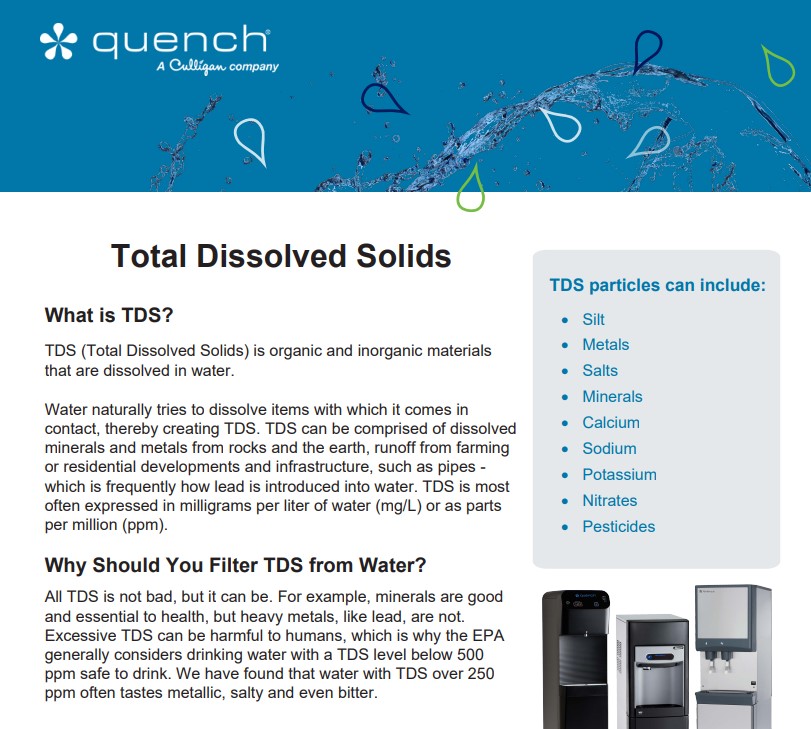Download our TDS Information Sheet.
What is TDS?
TDS is an acronym for Total Dissolved Solids.
What Are Total Dissolved Solids (TDS)
This term refers to the collection of substances contained within water, notably drinking water. TDS can be molecular or micro-granular in size and are comprised of both organic and inorganic matters. Organic matters found in drinking water may include, but are not limited to, algae, bacteria, pesticides, and disinfectants. Inorganic matters found in drinking water may include, but are not limited to, lead, arsenic, calcium, sodium, and chlorine.
What Are the TDS Standards?
TDS is most often measured in parts per million (ppm) or milligrams per liter of water (mg/L). The normal TDS level ranges from 50 ppm to 1,000 ppm. High levels of TDS can create “off” tastes and odors in drinking water, and it can also have technical effects. Dissolved solids can produce hard water, which leaves deposits and films on fixtures and can corrode the insides of hot water pipes and boilers.
On top of these standards, Quench recommends reverse osmosis (RO) water filtration for water with TDS over 250 ppm (parts per million) and requires it for water with TDS over 300 ppm. RO typically reduces TDS to under 25 ppm; distillation reduces TDS to under 10 ppm. Bottled mineral water typically has a TDS level of approximately 400-650 ppm.
How Do You Measure TDS?
To test for total dissolved solids, you can use a TDS meter. A TDS meter is a small hand-held device used to indicate the total dissolved solids in drinking water. These small devices are used by novices and water experts alike to assess just how many particles are in your drinking water. It’s important to know that the test can be misleading or misinterpreted by those unfamiliar with how it works.
The TDS meter gives a quantitative measure of the number of dissolved ions in the drinking water but does not tell you the qualitative nature of the ion. Thus, a TDS meter cannot tell you specifically what minerals, contaminates, and sediments are in your drinking water; it can only tell you how much via parts per million (ppm). Because of this, a TDS meter cannot tell you whether your drinking water is healthy to drink. Therefore, the total dissolved solids test should only be used as an indicator, not sole factor, to determine the general quality of the drinking water.
Get Clean, Great-Tasting Water With Quench
When you rent from Quench, you’re getting clean, great-tasting, drinking water thanks to our full suite of advanced filtration and purification technologies that remove sediment, eliminate bacteria, viruses, and parasites, reduce chemical contaminants, and get rid of off-tastes and odors.
Quench system can include:
- Advanced carbon filtration – reduces chlorine, chemical contaminants, sediment, and off-tastes and odors. Our newest carbon filter also removes 99.9% of lead.
- Reverse osmosis filtration – provides the highest level of purification and eliminates dissolved solids and pollutants including pesticides, nitrates, fluoride, and 99% of lead.
- Ultraviolet sanitization – kills bacteria and micro-organisms, including cryptosporidium and giardia, and prevents the growth of biofilm.
- Anti-microbial protection – silver ion technology provides continuous antimicrobial protection on equipment surfaces to kill or neutralize microorganisms.
- Food-grade tubing – odorless, tasteless, BPA-free tubing resists deterioration from UV sanitization.
- Stainless steel tanks – prevents growth of micro-organisms and biofilm.
Water travels through pipes that are often 50-100 years old before reaching your workplace, making your water susceptible to chemicals from corroded pipes. Using traditional 5-gallon bottled water coolers isn’t much of an improvement as these open-water systems can come in contact with germs, dust, and dirt each time the bottle is changed.
So what can you do to ensure your staff has access to clean water? Choose Quench. Instead of worrying, let Quench’s advanced filtration technologies assure that you will have an virtually endless supply of clean, great-tasting drinking water
Note: Certified NSF 42 and 53 (lead). Click here for more information. Assumes normal usage, regular preventive maintenance and filter changes.

